Issue 40 : 6 October 2019
Talofa Lava, Kia Orana, Malo E Leilei, Tena Koutou, Hello ...
... and welcome to the latest issue of “For The Love Of The Game”, the official e-zine of the New Zealand Amateur Sport Association Inc. We hope you enjoy reading the articles below.
If you have any feedback on this issue, ideas for future articles, or would like to contact the Editor, please click here. And, you are invited to forward the e-zine to others you know, who may be interested in reading it.
If you are interested in applying for membership of the Association, please click here.
2019 National Sport Club Survey Concludes This Week ...
The 2019 National Sport Club Survey will end next Friday, 11 October. All Sports Clubs are invited to participate in the survey, (with a $500 credit on sport apparel from Dynasty Sport to be won by one survey participant who enters the survey Prize Draw).
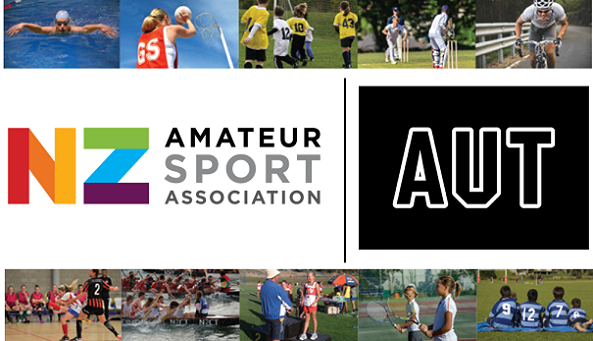
It’s intended to present the survey findings in Regional Seminars throughout New Zealand, commencing in November 2019. The Sport Leadership & Management Department at Auckland University of Technology (AUT) is a partner in this project, which is proudly supported by Pinnacle Corporation and Dynasty Sport.

If your Club would like to participate in the survey, please click here to provide your e-Mail contact details. This will enable the survey link to be sent to you.
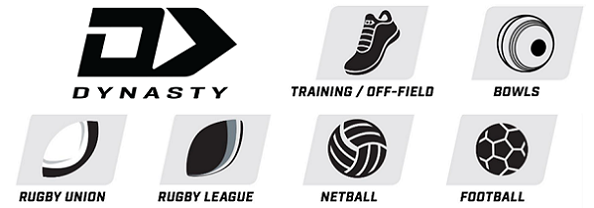
“Millhillians” Celebrate Love Of Their Game ...
Ross ("Roscoe") Bonett, somewhat coyly, says he’s "somewhere between 75 and 85 years old", although he indicates with a wink, that he might well be an octogenarian. As President of the Millhillians Rugby Football Club, based in Masterton, Roscoe took to the field yesterday in a Golden-Oldies match against a Horowhenua-Kapiti selection at Trust House Memorial Park, as the curtain-raiser to the Heartland Championship match between the two provinces. Wearing purple shorts, Roscoe can’t be touched if he receives the ball, however an unexpected hamstring injury meant he was left on the side-line for much of yesterday's match.
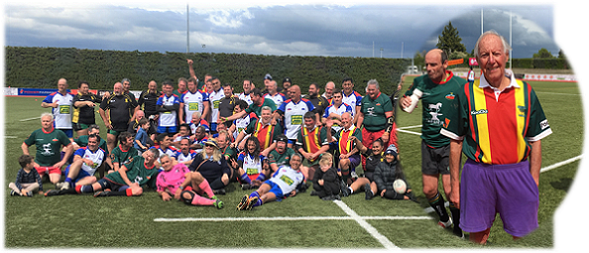
(Ross Bonett, right, "somewhere between 75 and 85" years of age, still playing)
Originally from Wellington, he played for the Athletic Club before moving to Martinborough and playing for Puketoi. It was in the Wairarapa in 1984 that Sir Brian Lochore suggested that the Golden-Oldies be named after the “Old Millhillians” Club in London, with Roscoe playing every one of the subsequent 35 seasons for the Club. The Association salutes Ross Bonett and those that continue to promote the love of their game.
“Grassroots Awards” Offers Model For New Zealand’s Sporting Codes ...
The Union of European Football Associations (UEFA) established annual “Grassroots Awards” in 2010, recognising that “football possesses an enduring power as a force for social good.”
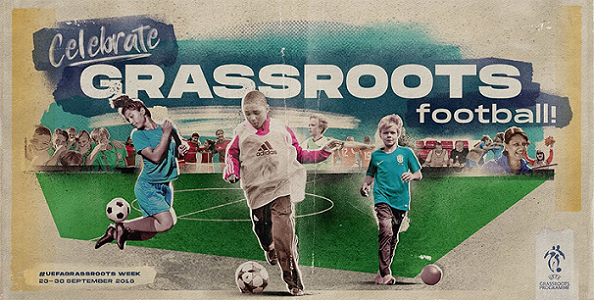
The “UEFA Grassroots Week” takes place in conjunction with the European Week of Sport and in co-operation with the European Commission. UEFA considers the grassroots as vital in helping football maintain its overall good health, acknowledging that the game is "built on the grassroots", and is kept alive by thousands of volunteers, projects and clubs across Europe. UEFA’s awards are designed to recognise, celebrate and promote this inspirational work.
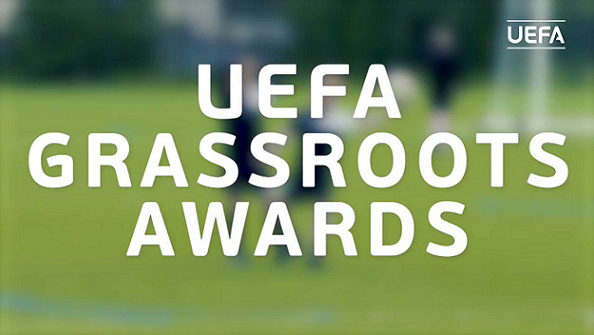
Perhaps New Zealand requires a similar series of awards and its own “Grassroots Week” to acknowledge the similar attributes which are fundamental to this country’s reputation as a nation of sports-lovers? The contribution of unpaid players, administrators and coaches should not be seen as an uncomfortable add-on to awards for professional sports-people, but rather should be considered as the unique, essential recognition upon which those that succeed on the national or international stage, is based.
New Book Celebrates Club Social History ...
Glenbeigh Books latest publication “The Ghost Rugby Clubs of Wellington”, tells the story of how over 140 seasons, Wellington’s Rugby Union clubs have united local communities and galvanised support for Rugby Union teams representing the Wellington Provincial District. Wellington's clubs have fulfilled a significant social purpose, celebrated by this book, in creating the means by which communities established an identity, a sense of common purpose and a connection across diverse racial, religious and cultural backgrounds.
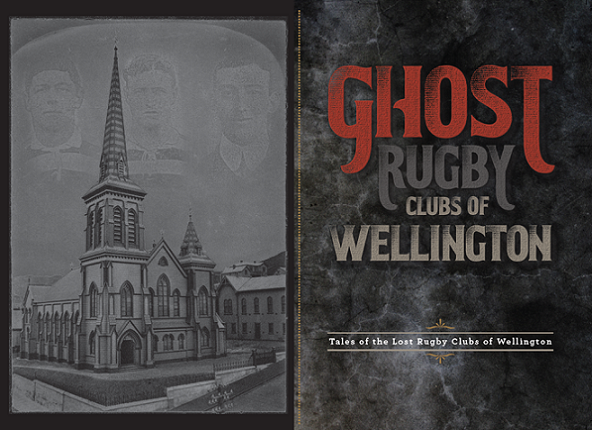
The book tells the stories of the clubs whose former existence has been long-forgotten, introduces their personalities, remembers their triumphs and also reflects on their disappearance from Wellington’s sporting scene. Their social history, while somewhat spectral to contemporary followers of the game, is nonetheless critical to understanding the purpose and nature of Rugby Union as an amateur game today.
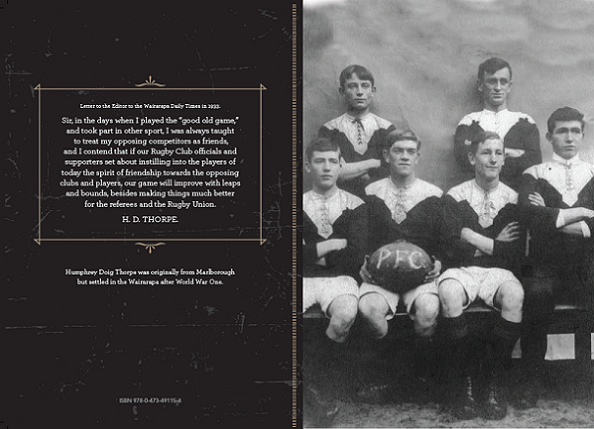
Proceeds from the sale of this book are being held in Trust by the Wellington Rugby Football Union, whose vision is that Rugby Union is a “game for all”, to be allocated as Grants for the benefit of those whose personal financial circumstances would not ordinarily allow them to join their local Rugby Union community club.
To order a copy of the book, please click here and provide your contact details.
Four In Five Say Volunteering Boosts Health ...
Research undertaken in the United Kingdom by “Citizens Advice” has shown that volunteering boosts employability, self-esteem and health. 4 in 5 people believe that volunteering has a positive effect on their health, while the research also revealed that 6 in 10 people felt less stressed as a result of being engaged in voluntary work.
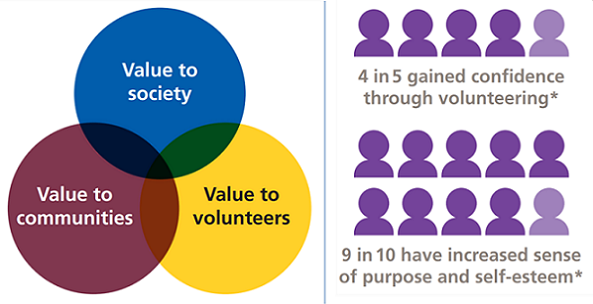
Among the more detailed findings, the research found: 9 in 10 people reported an increased sense of purpose or self-esteem; 4 in 5 believed that they had increased their employability; 9 in 10 felt more engaged in their community; 9 in 10 felt better equipped and empowered to deal with issues in their lives, with 4 in 5 also helping their friends and family.
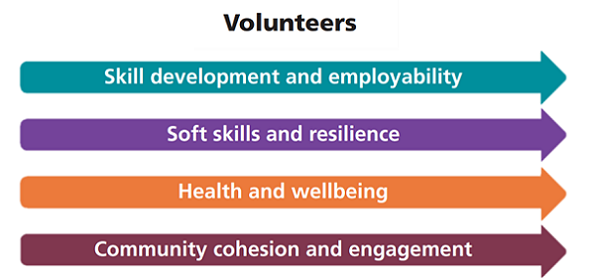
Community sport clubs provide an excellent way in which to combine a love-of-the-game with the social cohesion that arises by providing voluntary service. However, with reference to the above diagrams, many clubs may need to think more carefully about how the value provided by their volunteers is recognised, in order to encourage their ongoing support.
Viewpoint : Contact Sports Navigate Collision Course ...
The heaviest player at the 2019 Rugby World Cup has been reported by the press this week to weigh-in at a massive 153 kilogrammes, which is about twice as heavy as a keg containing around 60 litres of beer, as heavy as 50 standard bricks stacked together, or about the same as 150 litres of water. It perhaps goes without saying that attempting to stop that mass travelling at a speed of say 5 to 10 kilometres an hour (1.3 to 2.7 metres per second) or more on the football field, can pose risks to both the tackler and the ball-carrier.
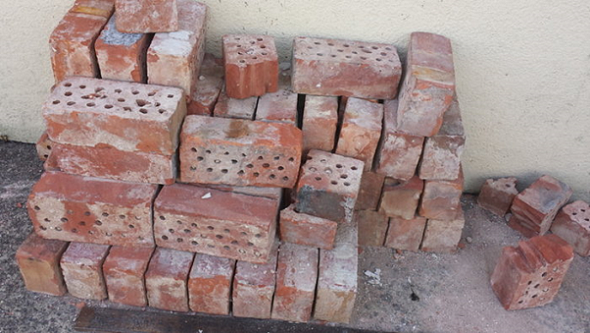
Rugby Union’s family relative, the NFL (American football) was an early adopter of “the collision” as a key feature of its spectator appeal. As early as 1898, it was reported that three died and thirteen were crippled, with the press declaring that “American football is more dangerous, demoralising and brutal than prize-fighting.” Soft leather helmets were subsequently introduced for players, which were worn for over 60 years, eventually evolving to today’s technology-laden NFL head-gear, which includes shock-detecting chin-straps. Despite the development of such advanced head protection, the NFL still reported over 200 concussions in its 2018 season.
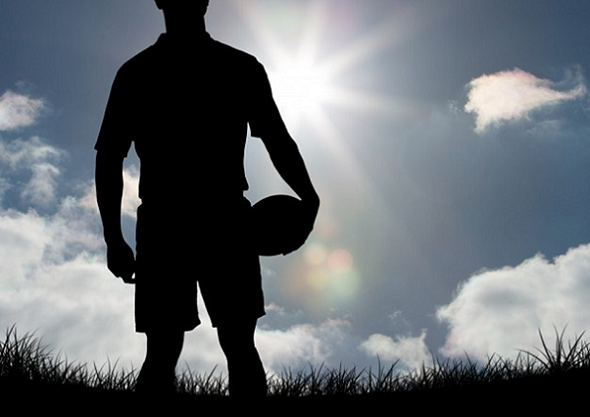
The challenge for many contact sports is to demonstrate how they can protect players from the risks which have become a key entertainment factor for many of their season-pass-holders. With awareness of the dangers now acute, parents in particular may well discourage participation of their children, where the risks of mental or physical impairment are not seen to be reasonably controlled by the rules of the game. Meanwhile, some sport governing bodies face a significant challenge when their "shop-window" show-cases the very risks that many participants simply want to avoid. Given the gladitorial nature of professional contact sport is unlikely to change any time soon, at the amateur level a combination of rule changes, revised coaching techniques and attitudinal change, may well be the mitigating actions required.
From the Archives ...
POVERTY BAY HERALD, VOLUME XLVII, ISSUE 15304, 27 AUGUST 1920
“A good crowd assembled yesterday afternoon at the Childers Road Reserve to witness the representative Rugby football match between Tokomaru Bay and Poverty Bay. The match was spoiled to a certain extent by downpours of rain, and owing to the greasy nature of the ground and the slippery ball, no very brilliant displays of combination were observed. Both teams put up a good showing, however, with occasional flashes of outstanding individual play. The game ended with the scores: Poverty Bay 6, Tokomaru Bay nil. Mr R. Burge was referee.”
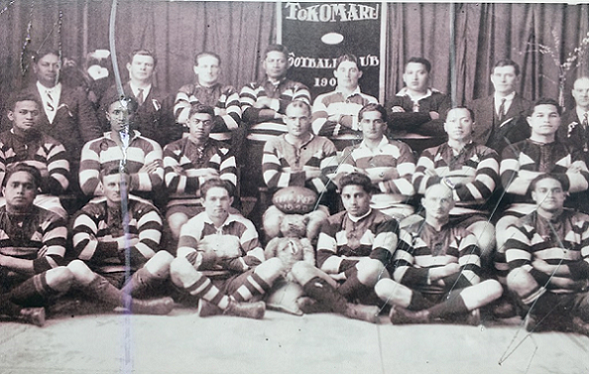
(The Tokomaru Bay representative Rugby Union team of 1920)
On the wharf at Tokomaru Bay on the eastern coast of the North Island, the derelict wharf adjacent to the ruins of the Gisborne Sheepfarmers’ Frozen Meat and Mercantile Company Limited, poignantly displays a sepia-tinged photo of the 1920 Tokomaru Bay Rugby Representative Team, (shown above).
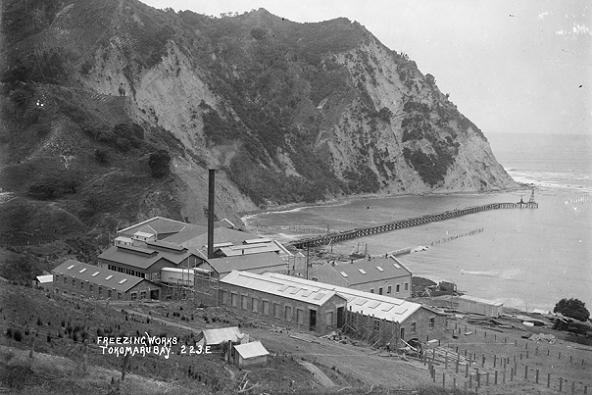
(The Gisborne Sheepfarmers’ Frozen Meat Company's Works at Tokomaru Bay)
In August 1920, the representative team travelled from Tokomaru Bay to Gisborne aboard the “Arahura” (a coastal steamer), to play Poverty Bay, receiving 5 pounds from the Poverty Bay Union, (in lieu of 50% of the sparse gate receipts). At the time, there were about 140 men employed in the Works at Tokomaru Bay, providing a considerable pool of players to represent the region on the sporting field.
Today, there are less than 30 people actively employed in the primary sector in Tokomaru Bay, with the Works closed on 7 July 1952 after having been earlier sold to Thos. Borthwick & Sons in 1945. However, Tokomaru Bay United Rugby Club continues to field a team in the Ngati Porou East Coast Rugby Union competition, a living example of how the sport continues to bind the community together.
The Final Word ...
“A lovely crowd, a lovely game; we had a nice feed and two beers. Well done!”
("Roscoe" Bonett, President, Millhillians Rugby Football Club)